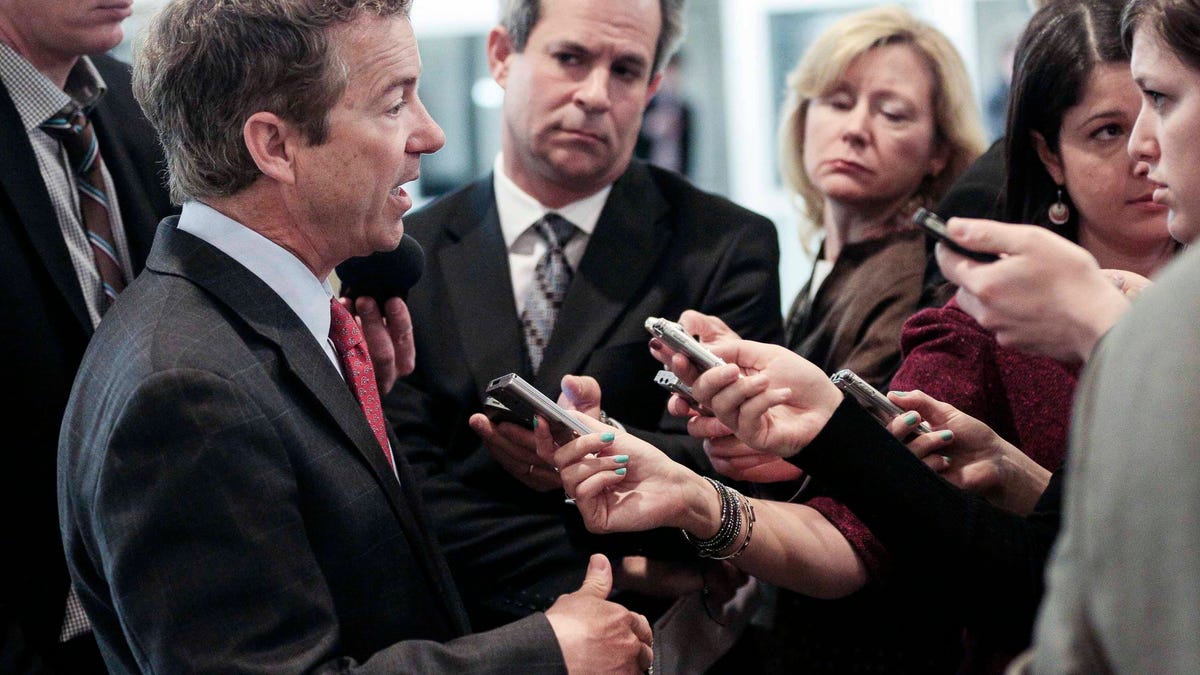Senators to IRS: Don't snoop on taxpayers' private messages
A dozen senators, including Democrats and Republicans, want the IRS to pledge publicly not to snoop on Americans' Twitter and Facebook messages and other correspondence without a warrant.

A dozen U.S. senators warned the IRS today against warrantless snooping on taxpayers' confidential e-mail, Facebook, or Twitter messages.
In a stiffly worded letter (PDF) to the tax collection agency, they asked the "IRS to confirm that it will immediately establish a warrant requirement when it wants to obtain e-mail and other electronic personal correspondence" from American companies.
The letter also asked the IRS to "provide a timeline" for updating its internal procedures to guarantee that the contents of electronic files would be accessed only after agents follow the privacy-protective traditional procedure of obtaining a search warrant signed by a judge. Among the senators signing it: Mark Udall (D-Colo.), Mike Lee (R-Utah), Rand Paul (R-Ky.), and Ron Wyden (D-Ore.).
It comes a day after the IRS's acting chief faced stiff questioning during a Senate hearing about the agency's controversial policies, and a week after internal documents surfaced -- first reported by CNET -- saying Americans enjoy "generally no privacy" in their confidential electronic communications.
During the Senate hearing, Steven Miller, the IRS' acting commissioner, said the agency would abandon its policy regarding warrantless e-mail access. But Miller said he did not know what the rules were for private communications exchanged through Facebook, Twitter, and similar services.
Today's letter said:
We remain troubled by press reports indicating that until today your agency claimed the authority to obtain citizens' private electronic communications, including e-mails, without a warrant. We believe these actions are a clear violation of the Fourth Amendment's prohibition against unreasonable searches and seizures. Accordingly, we urge the IRS to provide further details and a timetable for its plans to update policies to adhere to Americans' constitutional rights.
The letter didn't say so explicitly, but a clear subtext was a warning to other federal and local police agencies: warrants are not an option when accessing Americans' private communications.
An IRS representative did not immediately respond to a request for comment from CNET today.
A 2009 IRS Search Warrant Handbook obtained by the American Civil Liberties Union argues that "e-mails and other transmissions generally lose their reasonable expectation of privacy and thus their Fourth Amendment protection once they have been sent from an individual's computer." The handbook was prepared by the Office of Chief Counsel for the Criminal Tax Division and obtained through the Freedom of Information Act.
That places the IRS at odds with a growing sentiment among many judges and legislators, who believe that Americans' e-mail messages should be protected from warrantless search and seizure. They say e-mail should be protected by the same Fourth Amendment privacy standards that require search warrants for hard drives in someone's home, or for a physical letter in a filing cabinet.
The IRS continued to take the same position, the documents indicate, even after a federal appeals court ruled in the 2010 case U.S. v. Warshak that Americans have a reasonable expectation of privacy in their e-mail. A few e-mail providers, including Google, Microsoft, Yahoo, and Facebook, but not all, have taken the position that Warshak mandates warrants for e-mail.
A phalanx of companies, including Amazon, Apple, AT&T, eBay, Google, Intel, Microsoft, and Twitter, as well as liberal, conservative, and libertarian advocacy groups, have asked Congress to update the 1986 Electronic Communications Privacy Act to make it clear that law enforcement needs warrants to access private communications and the locations of mobile devices.
In November, a Senate panel approved the e-mail warrant requirement, and last month Rep. Zoe Lofgren, a Democrat whose district includes the heart of Silicon Valley, introduced similar legislation in the House of Representatives. The Justice Department indicated last month that it will drop its opposition to an e-mail warrant requirement.
The IRS' criminal-investigation division boasts nearly 4,000 employees, about 2,600 of whom are special agents who investigate suspected tax criminals. Willfully attempting to conceal income from the IRS is a crime.
IRS statistics for the fiscal year that ended last month show that it secured nearly 2,000 indictments against Americans during that period, with an average prison term of 46 months.

